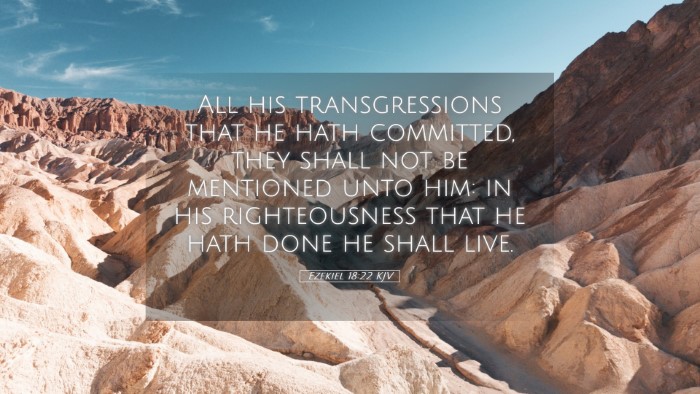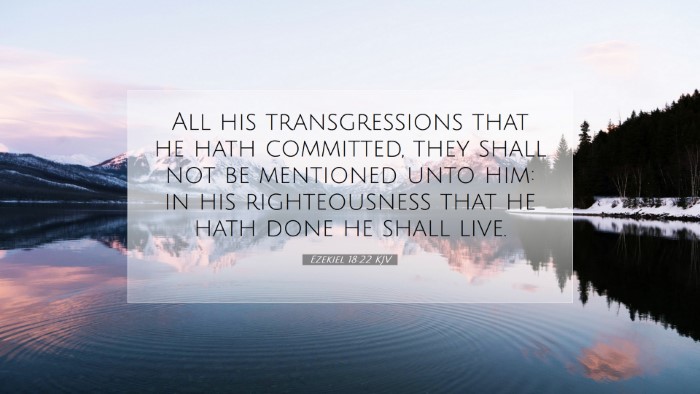Ezekiel 18:22 Commentary
Bible Verse: "As for all his transgressions that he hath committed, they shall not be mentioned unto him: in his righteousness that he hath done he shall live."
Introduction
The profound principles encapsulated in Ezekiel 18:22 speak to the heart of divine justice and mercy. This verse highlights the significance of righteousness and the transformative power of repentance. It offers profound insights into God's character as a just and gracious judge, a theme echoed consistently throughout Scripture. In this commentary, we draw from the rich legacy of public domain commentaries, including the works of Matthew Henry, Albert Barnes, and Adam Clarke, to illuminate various facets of the text.
Theological Significance
This verse presents a critical theological assertion regarding individual responsibility for sin and righteousness. The idea that past transgressions will not be held against a person who has turned to righteousness is both liberating and challenging. Theologically, this reaffirms the doctrine of personal accountability and underscores the possibility of moral renewal.
Matthew Henry's Insights
Matthew Henry emphasizes the radical nature of God's grace as presented in this verse. He notes that it illustrates the sinner’s hope through repentance. God's willingness to forgive and forget past iniquities is a testament to His mercy. Henry points out:
- Divine Forgiveness: If a sinner turns from their sins, they are not only forgiven but are also empowered to live righteously.
- Significance of Righteousness: The righteousness performed not only secures life in the physical sense but fosters a spiritual vitality in communion with God.
Albert Barnes' Commentary
Albert Barnes provides a nuanced understanding of the conditionality of divine forgiveness. He notes the emphasis on the necessity of repentance and reformation. Barnes articulates that:
- Future Conduct Matters: The future behavior of a person post-repentance supersedes their past failings. It points towards how God evaluates not just our past, but our present and future.
- Justice of God: God's justice is depicted as both righteous and merciful. While sin has consequences, true repentance alters one's standing before God.
Adam Clarke's Perspective
Adam Clarke approaches the text with a focus on the moral implications of the promise of life. He asserts that:
- Life Through Righteousness: Clarke stresses that the righteousness mentioned should not merely be seen as an act but as an ongoing state of being - living in adherence to God's commandments.
- The Unlimited Nature of Grace: Clarke highlights that God's grace is not limited by past sins; rather, it invites sinners to renew their relationship with Him through authentic change.
Practical Applications
The insights derived from this verse encourage both personal and communal reflection. Pastors, students, and theologians may consider the following applications:
- Emphasizing Individual Responsibility: In sermons, it is vital to articulate the personal nature of sin and the necessity of individual repentance for restoration.
- Extending Grace and Forgiveness: Church leaders should model the grace of God by encouraging a culture where repentance is met with restoration rather than condemnation.
- Assurance of Salvation: In teaching, believers should be reassured that their past does not define their future when they turn to righteousness.
Conclusion
Ezekiel 18:22 serves as a profound reminder of the power of God’s grace and the transformative potential of repentance and faith. The collective insights from Matthew Henry, Albert Barnes, and Adam Clarke elucidate the significance of this verse for understanding the balance of justice and mercy in God’s redemptive plan. It calls all believers to reflect on their lives, embrace the possibility of change, and live in the righteousness that leads to life.


